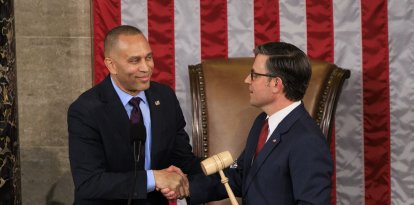Analysis
Dignity Act: A Bipartisan Proposal to Reform the U.S. Immigration System
The bill aims to stop illegal immigration, provide a dignified solution for undocumented immigrants, strengthen the U.S. economy and workforce, and ensure America's future competitiveness.

Immigrants sleeping in the vicinity of the Roosevelt Hotel, in New York.
A bipartisan group of representatives, led by Maria Elvira Salazar (R-FL) and Veronica Escobar (D-TX), introduced on May 23, 2023, the Dignity Act (HR 3599), an updated version of a bill that seeks to address flaws in the U.S. immigration system.
This initiative has the initial support of Jenniffer González-Colón (R-PR), Hillary Scholten (D-MI), Lori Chávez-DeRemer (R-OR), Kathy Manning (D-NC), Mike Lawler (R-NY) and Adriano Espaillat (D-NY).
The Dignity Act is founded on four key principles: stopping illegal immigration, providing a dignified solution for undocumented immigrants, strengthening the U.S. economy and workforce, and ensuring America's future competitiveness.
Inspired by values of dignity and redemption, the legislation was drafted in consultation with business leaders, the agricultural sector, faith communities, border security experts and immigration reform groups.
Hoy presenté la Ley Dignidad: ¡El Congreso tiene que actuar y acabar con la crisis migratoria de una vez por todas! pic.twitter.com/B7l5IdxFwr
— María Elvira Salazar 🇺🇸 (@MaElviraSalazar) May 23, 2023
The bill proposes comprehensive measures to secure the border, including a $25 billion investment in infrastructure, advanced technology, and hiring new Border Patrol agents.
It also establishes a mandatory nationwide E-Verify system to ensure that businesses hire legal workers and strengthens penalties against traffickers and transnational criminals.
To reform the asylum system, the law speeds up processing and creates five humanitarian campuses on the southern border to serve applicants immediately and establishes prescreening centers in Latin America to reduce migration flows to the United States.
Illegal immigrants
As for undocumented immigrants, the Dignity Act introduces a seven-year Dignity Program that allows those eligible to work, pay restitution, and obtain renewable legal status, provided they meet requirements such as background checks and good behavior.
In addition, it offers an optional five-year Redemption Program that can lead to permanent residency for those who complete the initial program, learn English, perform community service, and meet other conditions. Dreamers and TPS beneficiaries would receive immediate protection and a simplified pathway to legalization.
Economy
To strengthen the economy, the bill addresses labor shortages by modernizing the H-2A program, creating a Certified Agricultural Worker program, and streamlining processes for work visas. It also establishes the U.S. Workers Fund, funded by immigrant restitution payments, to train local workers and ensure their competitiveness in a changing economy. The legislation ensures that no cost will fall on taxpayers, as it will be funded through fees and payments from program participants.
"Our broken immigration system is frustrating Americans, causing people to suffer, and fracturing our country,” Salazar said. "Dignity Act. This bill gives dignity to the border agents who need support, the job creators who need employees, the American people who need secure borders, and those who currently live in the shadows.”
For his part, Escobar stressed the urgency of a bipartisan solution: "The humanitarian crisis unfolding before our eyes requires a bipartisan solution, compassion, and action. The Dignity Act of 2023 offers a bipartisan, meaningful approach that restores dignity to people."
Other co-sponsors underscore the bill's relevance
González-Colón highlighted the contribution of immigrants and the need to address illegal immigration, while Scholten, who has experience in immigration issues, emphasized that the current system represents a threat to national security and a humanitarian crisis.
Chavez-DeRemer advocated for an approach that combines border security with compassion, and Manning noted that the bill will strengthen the economy by addressing labor needs.
Lawler stressed the importance of a functional immigration system to integrate those already in the country.
According to its sponsors, the Dignity Act represents a historic effort to overcome decades of inaction in Congress by proposing a balance between security, humanity, and economic prosperity. Its success will depend on lawmakers' ability to maintain bipartisan support and overcome political divisions on such a complex issue.


























